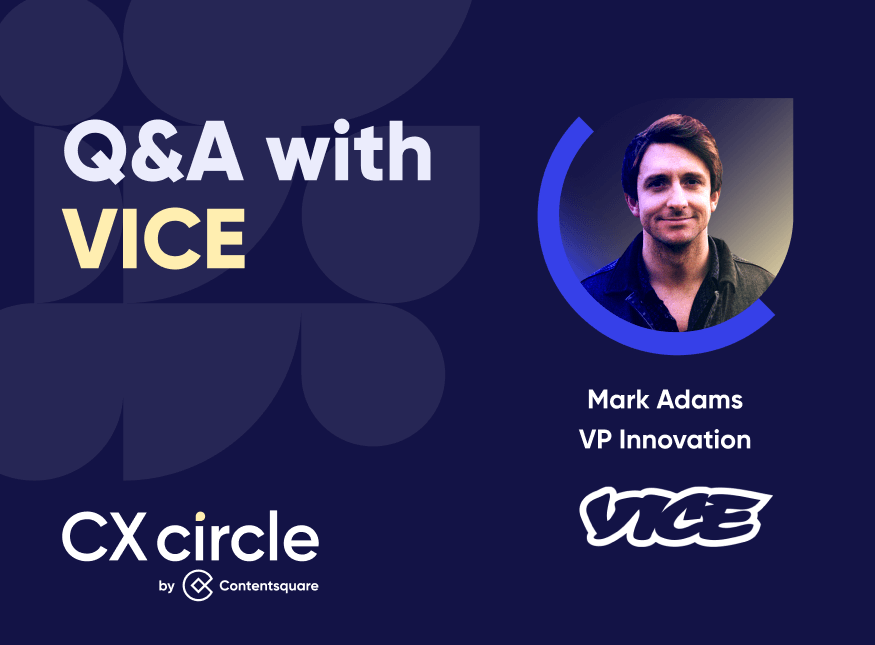
Catch up on all the best of CX circle London
Step into the future of human digital experiences with VICE, Lovehoney, Sky and more leading brands.

VICE is one of the world’s biggest media companies for young people, known for its edgy content. Since joining the company as VP of Innovation, Mark Adams has helped drive transformation and diversification.
From acquiring the Old Blue Last pub to I-D, a street fashion media for Gen Z, he’s played a key role in growing the business. Now, less than 10% of the company’s revenue comes from what most people know as VICE Media.
In this Q&A, Mark gives his two cents on all things customer experience and digital innovation. Watch the interview below to hear his hard-hitting answers to questions submitted by our CX circle London registrants. Heads up, he’s a bundle of energy!
This transcript has been edited for clarity and length.
Mark Adams: This is the most sanity-inducing statement you’ll ever hear if you work in digital: The internet is an interconnected set of networks. That’s all it is—interconnected networks.
So, the level of digital understanding you have is literally directly proportional to how often you think about, talk about and activate networks. The more you do that, the more digital you are. I think that’s going to be proven more over the next year and every single year after that because it’s a foundational first principle.
MA: The biggest myth of consumer experience is that you should define your consumer demographically in a way that they would never define themselves. People do that all day long—when we sit around board boardrooms and think about customer experience, we say our customers are “19 to 25-year-old females in Paris and London ”, but there’s no cohesion score. I’m the same age as lots of people, but that doesn’t mean we have much in common.
So, the biggest myth is that in order to get somewhere, you’ve got to go for an incredibly broad target audience to try and design anything, let alone an experience for them.
MA: If I could go back to any time, I would’ve seen that the natural consequence of this thing that allows 4.5 billion people to connect with each other would mean that big players, like Madonna or Oprah Winfrey, don’t control culture.
What we’re realizing now, is that most conversations online are about somebody talking about something they’re deeply passionate about to a group of people who’ve never heard of it. And I wish I had seen that earlier…
I spent six years at William Morris dealing with Usher, Lady Gaga and Hugh Jackman. And I was wasting my time because those guys were part of an old world. I should have been finding Mr. Beast. And I will never forgive myself.
MA: It’s not all smoke and mirrors. It will go through the same hype cycle that everything goes through. It starts with the early adopters, moves to the innovators, and then it’s going to fail several times before it hits the mainstream. VR has been doing that for 20 years.
The answer to who is going to do it best is whoever has the biggest and best data sets. And unfortunately, that’s probably, therefore, going to be Amazon.
MA: AI is a miracle in some sense, but in another sense, it’s healthy to remember how simple it still is. At some point, this will change but for the next 10 years, all AI will have the ability to do is pattern recognition.
I love this guy Ray Dalio, and I think he’s gone as far as anybody can go for now in identifying where the right place for human decision-making is and where the right place for artificial intelligence is. If you read the book, they’ve built this incredible system using artificial intelligence in every meeting at Bridgewater Capital. They map and transcribe meetings and put it into artificial intelligence to realize, ”Dave’s an absolute expert at this, but every statement he’s made about this, this, and this has been wrong.”
So I think AI will help us realize who’s got a pretty good strike rate about being correct—another person may be a genius in something else but has no clue when it comes to a particular discipline. That’s where I think the synthesis between AI and human decision-making will map out.
MA: I’m like the Grinch who stole Christmas when it comes to innovation. If you invest money and, more importantly, time into Web 3.0 without having a fundamental grasp of first principles, it’s going to be really brutal.
At a higher level, there needs to be a strategy. You need to figure out what that strategy is and then apply it with every new thing that comes along — that’s how you get sanity.
What I’m going to talk about is Web 3.0—It’s so exciting, but I also want to reinforce that if you go into it with your eyes closed, it will eat you alive and spit you out. During my talk, I’ll be giving some realness around why Web 3.0 is exciting but also why you’ve got to do your groundwork on the first principles first.
Catch Mark’s session on How to stay sane in the Web 3.0 Hurricane at CX circle London and hear from other leading brands like Clarins, Sky and DICE. Register here.

Catch up on all the best of CX circle London
Step into the future of human digital experiences with VICE, Lovehoney, Sky and more leading brands.